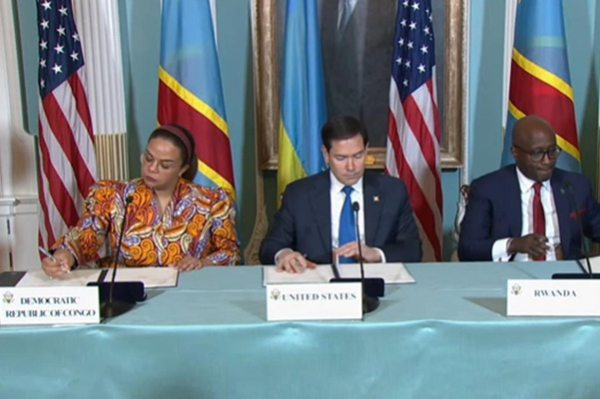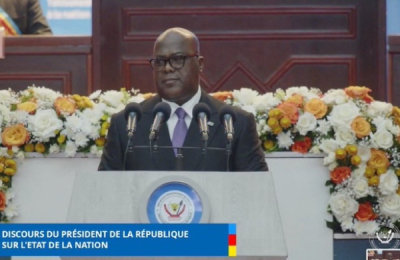On April 25, 2025, the Democratic Republic of Congo (DRC) and Rwanda signed, in Washington, the "declaration of principles" to draw up a draft peace agreement for discussion on May 2.
The text lays down classic foundations: respect for sovereignty, non-interference, an end to support for armed groups, joint security coordination, return of refugees, support for MONUSCO, and promotion of regional economic integration. But an analysis of the speeches delivered at the signing reveals different priorities for different players.
DRC Puts Peace First
Congolese Foreign Minister Thérèse Kayikwamba Wagner, stressed the urgency of the move, saying: "In Goma, Bukavu and beyond, the reality is one of displacement, insecurity and hardship. For us, the urgency of this initiative is not theoretical, it is human."
She also demanded the "immediate, unconditional and verifiable" withdrawal of foreign troops, asserting that, "Peace must come first, then we can build trust, and only then engage in bilateral cooperation."
Rwanda Wants to Address Root Causes
Rwanda's Minister of Foreign Affairs, Olivier Nduhungirehe, for his part, insisted on the need to tackle the roots of the conflict: "We must address the root causes to achieve lasting peace," he insisted.
Kigali ties these causes to the "complex history" of the region. Rwanda continues to justify the M23's action by the defense of "Rwandophone populations" in Kivu and considers the Forces démocratiques de libération du Rwanda (FDLR), refugees in eastern DRC since the 1994 Rwandan genocide, as an "existential threat". The country's stated aim is to achieve "a secure region, free from violent ethnic extremism, and well governed."
US Targets Favorable Ecosystem
The United States, officially a "witness" to the process, is aiming beyond mediation. Secretary of State Marco Rubio said, "A lasting peace in the eastern Democratic Republic of Congo will open the door to greater US and Western citizen investment, which will create an ecosystem conducive to responsible and reliable supply chains for things like critical minerals. It's a win-win."
"We are discussing how to build new regional economic value chains linking our countries, including with US private sector investment," confirmed the Rwandan Minister of Foreign Affairs. Washington is currently negotiating a bilateral agreement with Kinshasa to secure access to strategic minerals.
Absent but Influential Players
Beyond the signatories, other players and interests are weighing in on the process. The United States accuses Chinese companies of taking advantage of the chaos to exploit resources illegally.
The governor of South Kivu, Jean-Jacques Purusi Sadiki, recently spoke of the existence of 1,600 illegal companies, mainly Chinese-owned, feeding a vast smuggling network that also benefits Rwanda. According to his estimates, 67% of this illegal production is destined for the Middle East, while China accounts for another significant share. Europe would remain marginal in these flows.
Countries such as Burundi and Uganda, as well as South Africa, which has already lost several soldiers, will also have to take their military interests into account. Finally, internal political tensions in the DRC further complicate the equation.
Authorities accuse former president Joseph Kabila of supporting the rebellion, adding a domestic political dimension to an already complex crisis.
This article was initially published in French by Georges Auréole Bamba
Edited in English by Ola Schad Akinocho










